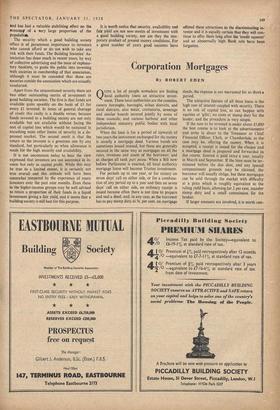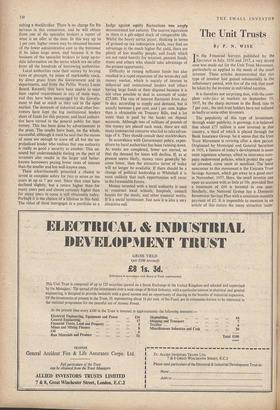6wporation Mortgages
By ROBERT EDEN QUITE a lot of people nowadays are finding local authority loans an attractive invest- ment. These local authorities are the counties, county boroughs, boroughs, urban districts, and rural districts; also water, crematoria, sewerage and similar boards secured jointly by some of these councils; and various harbour and other independent statutory public bodies' with local jurisdiction.
When the loan is for a period of upwards of two years the instrument exchanged for the money is usually a mortgage deed. Various bonds are sometimes issued instead, but these are generally secured in the same way as mortgages on all the rates, revenues and assets of the borrower; and as charges all rank purl passu. When a Bill now before Parliament is enacted, all local authority mortgage loans will become Trustee investments.
For periods up to one year, or for money on seven days' call on either side, or for a combina- tion of any period up to a year and then on seven days' call on either side, an ordinary receipt is issued because often there is not time to prepare and seal a deed; and, in any case, as the borrower has to pay stamp duty at 5s. per cent. on mortgage
deeds, the expense is not warranted for so short a period.
The attractive feature of all these loans is the high rate of interest coupled with security. There is no risk of capital loss, as can happen with equities or `gilts'; no costs or stamp duty for the lender; and the procedure is very simple.
If the sum to be invested is under about £5,000 the best course is to look at the advertisements and write in direct to the Treasurer or Chief Financial Officer, Clerk, or Chamberlain, as the case may be, offering the money. When it is accepted, a receipt is issued for the cheque and a mortgage deed is prepared and forwarded in due course. Interest is paid twice a year, usually in March and September. If the loan must be ter- minated before the due date, and any special compassionate grounds may be claimed, the borrower will usually oblige; but these mortgages can be sold through the market with difficulty at a price which is roughly equivalent to the ruling yield basis, allowing for 2 per cent. transfer stamp duty and a small commission for the broker.
If larger amounts are involved, it is worth con- suiting a stockbroker. There is no charge for his services in this connection, and he will obtain from one of the specialist brokers a report of what is on offer at the time. In this way up to + per cent. higher return may be obtained because of the lower administrative cost to the borrower if he takes large sums, and because it is the business of the specialist brokers to keep up-to- date information on the terms which are on offer from all the hundreds of borrowing authorities.
Local authorities raise their money by levying rates or precepts, by issues of marketable stock, by direct grant from the Government and its departments, and from the Public Works Loans Board. Recently they haVe been unable to meet their capital requirements in any of theie ways, and they have been encouraged by the Govern- ment to find as much as they can in the open market. The demands of industrial and other bor- rowers have kept the big institutional lenders short of funds for tills purpose, and local authori- ties have turned to the general public for their money. This has been done by advertisement in the press. The results have been, On the whole, successful, although it must be said that the names of some are enough to scare off all but the un, prejudiced lender who realises that one authority is really as good a security as another. This un- sound but understandable feeling on the part of investors also results in the larger and befter- known borrowers paying lower rates of interest than the smaller and less well-known ones.
These advertisenients presented a chance to invest in complete safety for two to seven or ten years at up to 7 per cent. Since then rates have declined slightly, but a return higher than for many years past and almost certainly higher than for many years to come is still obtainable today. Perhaps it is the chance of a lifetime in this field. The value of these mortgages in a portfolio as a
hedge against equity fluctuations was amply demonstrated last autumn. The nearest equivalent to them is a gilt-edged stock of comparable life. Whilst the heavy surtax payer, thinking in terms of grossed-up tax redemption yields, may find no advantage in the much higher flat yield, there are plenty of less wealthy people, and fUnds which are not rated heavily for taxation, pension funds; trusts and others who should take advantage of the present opportunity.
Difficulty in raising sufficient funds has also resulted in a rapid expansion of the seven-day call money market, which is mainly of interest to industrial and institutional lenders and others having large funds at their disposal because it is not often pOssible to deal in amounts of under £25,000. The rate of interest fluctuates from day to day, according to supply and demand, but is usually between •i• per cent, and per cent. higher than is obtainable on Treasury Bills, and a lot more than is paid by the banks on deposit accounts. Although tens of millions of pounds of this money are placed each week, there are still many commercial concerns who fail to take advan- tage of it. They should consult their stockbrokers.
In accordance with Government policy, expen- diture by local authorities has been running down. As works are completed, fewer are started, so that the demand for loans will decline. If, as at present seems likely, money rates generally be- come lower, then the attractive terms of today will no longer be available. If there should be a change of political leadership at Whitehall it is most unlikely that such opportunities will recur in the foreseeable future.
Money invested with a local authority is used to construct local schools, hospitals, council houses for the needy, and other essential works. It i's ,a social investment. Just now it is also a very attractive one.







































 Previous page
Previous page